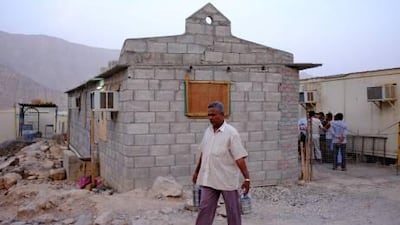Ras Al khaimah // The mosque that serves the men who build the country's mountain highways is a humble one.
The concrete shell that serves engineers and workers at the labour camp on Jebel Jais is the centre of an isolated, makeshift community that takes pride in its Ramadan traditions.
"We are living peacefully in the village," says Mohammed Ali, a transport operator. "We are living like brothers. Everybody is friendly and working together. Only our homes are separate."
The mosque, the highest in the country, was built by two masons in two weeks when the camp moved to the site three years ago.
Worshippers hope it remains after they leave so travellers can stop for prayer. They say it will be a reminder of their life here long after they are gone.
"We'll keep it here forever," says Mr Ali. "We'll not destroy it."
The inside of the mosque is sparse. The mihrab that points to Mecca is four lines of masking tape. Walls are decorated with a few calligraphy prints.
There is no satellite connection for the call to prayer from the city, as is the case with urban mosques. Prayer times are taped to the wall, a final favour of the camp's electrician, the imam, before he left on holiday to Pakistan.
The imam was selected because of his wisdom and "very fine beard", which the clean-shaven workers all make a point of mentioning.
Men take turns reciting the call to prayer. One man known for the timbre of his voice stands at the corner of the mosque, plugs his ears and calls workers over the braying of donkeys and goats.
The mosque was not built to accommodate the camp's 55 Muslims all at once. Workers usually arrive for prayer in shifts.
Roadworks during Ramadan take place between 6.30am and 1pm, after a 3am breakfast and fajr prayers. The workers say they never miss a prayer on the mountain.
"All our prayers are in this mosque," says Mohammed Mahdi, 19, a welder from Afghanistan. "This country is a little hot but every day with prayer we are coming nearer to God."
The camp of 160 workers is a mix of religions, so the evening meal is not eaten by all workers at the same time or place.
Instead, men rush to the kitchen as dusk descends and carry trays of dahl, kebabs and pakoras back to their cabins as with any other day. Some eat immediately.
The Muslim workers wait several minutes after their mobiles tell them it is iftar, to be sure it is sufficiently dark outside. Every man receives 2kg of dates a week, and an apple and orange a day with which to break fast.
The kitchen offers two menus: one for Indian, Pakistani and Nepalese workers, and a milder one catering for Iranian and Afghan taste buds.
The men bring their own touch to each meal. At Monday's iftar, Kush Bahar, 46, a foreman, brought herbs from his garden.
Ali Shir Saremi, 41, a civil engineer, brewed a hot drink of sugar rocks, dried lemon and purple ox-tongue petals, bought on his trips home to Iran.
"My wife makes it better," Mr Saremi says. "This is nothing."
These men have shared iftars since 1999, when they worked on the Wadi Helu mountain motorway and Kalba's Corniche Road.
After prayers, they relax with games of carom or chess. Then there is music, reserved for special occasions. And everyone participates - Muslim or not.
Nepalese men sit on coolers outside their cabin, singing and drumming in the cool mountain air tinged with incense. Dancers twist waists and wrists to the tune of a wooden flute.
The Punjabi men at the cabin opposite set up a stereo boom box, and the synthetic beat of the Vengaboys echoes off the mountains. Perfect, they say, for the big jumps of their Punjabi dance.
In this way, the whole community shares Ramadan in and around the mosque.

